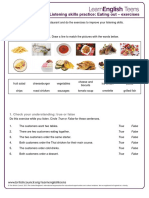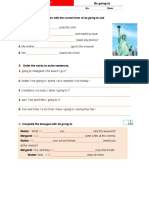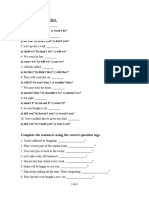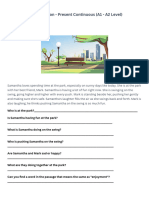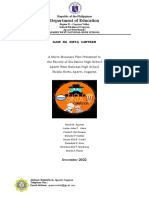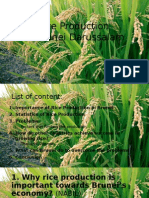0 ratings0% found this document useful (0 votes)
190 viewsGrammar Structures
Grammar Structures
Uploaded by
nikitetThe document provides examples and exercises to illustrate the difference between using the present continuous and present simple tenses in English grammar. It shows how the present continuous is used to describe temporary or ongoing actions happening now (e.g. "She is studying") while the present simple is used for permanent or repeated actions (e.g. "He usually does his homework"). A series of exercises then tests the reader's ability to choose between the present continuous and present simple forms based on whether the action is ongoing or habitual.
Copyright:
© All Rights Reserved
Available Formats
Download as PPTX, PDF, TXT or read online from Scribd
Grammar Structures
Grammar Structures
Uploaded by
nikitet0 ratings0% found this document useful (0 votes)
190 views4 pagesThe document provides examples and exercises to illustrate the difference between using the present continuous and present simple tenses in English grammar. It shows how the present continuous is used to describe temporary or ongoing actions happening now (e.g. "She is studying") while the present simple is used for permanent or repeated actions (e.g. "He usually does his homework"). A series of exercises then tests the reader's ability to choose between the present continuous and present simple forms based on whether the action is ongoing or habitual.
Original Description:
grammar
Copyright
© © All Rights Reserved
Available Formats
PPTX, PDF, TXT or read online from Scribd
Share this document
Did you find this document useful?
Is this content inappropriate?
The document provides examples and exercises to illustrate the difference between using the present continuous and present simple tenses in English grammar. It shows how the present continuous is used to describe temporary or ongoing actions happening now (e.g. "She is studying") while the present simple is used for permanent or repeated actions (e.g. "He usually does his homework"). A series of exercises then tests the reader's ability to choose between the present continuous and present simple forms based on whether the action is ongoing or habitual.
Copyright:
© All Rights Reserved
Available Formats
Download as PPTX, PDF, TXT or read online from Scribd
Download as pptx, pdf, or txt
0 ratings0% found this document useful (0 votes)
190 views4 pagesGrammar Structures
Grammar Structures
Uploaded by
nikitetThe document provides examples and exercises to illustrate the difference between using the present continuous and present simple tenses in English grammar. It shows how the present continuous is used to describe temporary or ongoing actions happening now (e.g. "She is studying") while the present simple is used for permanent or repeated actions (e.g. "He usually does his homework"). A series of exercises then tests the reader's ability to choose between the present continuous and present simple forms based on whether the action is ongoing or habitual.
Copyright:
© All Rights Reserved
Available Formats
Download as PPTX, PDF, TXT or read online from Scribd
Download as pptx, pdf, or txt
You are on page 1of 4
Grammar structures
Present continuous vs present simple
PowerPoint Presentation by:
Nedmiran Beqiri
Present continuous vs present simple
Exercises
I ____________
play (play) golf every weekend.
The children ___________
are playing (play) outside at the moment.
Haruka ____________
is working (work) today.
You can’t borrow my lawnmower because it doesn’t _________
work (work)
Smells good, What are you _____________ making (make) ?
My husband never (make) ___________ makes me breakfast.
Pauline ___________
is living (live) in Hong Kong now.
Do you still ____________(live)
live with your parents?
Present continuous vs present simple
Exercises
(you / come) tonight? ? ______________________? Are you coming tonight
(he / eat) rice every day? ______________________? Does he eat rice every day
(he / come) to London often ___________________? Does he come to London often
(he / play) tennis now. ________________________.
He is playing tennis now
(they/ not/ come) to the party tomorrow.
___________________________________________.
They aren’t coming to the party tomorrow
(He/ not/ play)golf now. _______________________.
He isn’t playing golf now
(She/ not/ go) to the cinema very often.
___________________________________________.
She doesn’t go to the cinema very often
(you/ not/ go) out later. _______________________.
You aren’t going out later
Present continuous vs present simple
Exercises
You ________________(not/like)
don’t like chocolate.
She ________________(not/study)
isn’t studying at the moment.
He usually______________(not/do)
doesn’t do his homework.
They __________________(not/eat)
don’t eat rice every day.
We ____________________(not/study)
don’t study every night.
_________________________(you/like)
Do you like spicy food?
_____________________(she/go)
Does she go to Scotland often?
_______________________________(he/eat)
Is he eating now?
You might also like
- J2 - Wider World 1 - FINAL EXAM - 2021Document9 pagesJ2 - Wider World 1 - FINAL EXAM - 2021SYLVIA SANTACREUNo ratings yet
- PTE Springboard: Pearson Test of English Young LearnersDocument4 pagesPTE Springboard: Pearson Test of English Young LearnersLucia Vladimirova0% (1)
- 1d Present Simple (Negative and Interrogative)Document2 pages1d Present Simple (Negative and Interrogative)Pety Punk100% (1)
- 150 Deep Covered Baker RecipesDocument93 pages150 Deep Covered Baker Recipesapi-258754044No ratings yet
- Present Simple or Present ContinuousDocument1 pagePresent Simple or Present ContinuousTigre 909No ratings yet
- Go Getter 3 Grammar Check 6BDocument1 pageGo Getter 3 Grammar Check 6BАнна КозыреваNo ratings yet
- Present Simple: Evelyn'S Daily RoutineDocument7 pagesPresent Simple: Evelyn'S Daily RoutineValentina Parra C100% (1)
- Revision Worksheet - Present Simple and Daily Routine, Question Words, Adverbs of Frequency, TimeDocument4 pagesRevision Worksheet - Present Simple and Daily Routine, Question Words, Adverbs of Frequency, TimeEugenia TotinhoNo ratings yet
- Past Continuous-1Document1 pagePast Continuous-1Öcal ŞensoyNo ratings yet
- Skills Test B: ListeningDocument4 pagesSkills Test B: ListeningMaxi ComasNo ratings yet
- Grammar Primary 3Document134 pagesGrammar Primary 3mohamed IbraheemNo ratings yet
- Link IV Unit 4 Test ADocument2 pagesLink IV Unit 4 Test AAneta WarchołNo ratings yet
- Unit 1 MLHDocument11 pagesUnit 1 MLHNguyễn Thu Huyền100% (1)
- Go Getter 3 Grammar Check 7BDocument2 pagesGo Getter 3 Grammar Check 7BАнна КозыреваNo ratings yet
- Navigate A2 Exam Unit5 A22Document3 pagesNavigate A2 Exam Unit5 A22Esther Rivero RamírezNo ratings yet
- Sample TB B1Document231 pagesSample TB B1DavidNo ratings yet
- A. On B. To C. In: © Cambridge University Press PhotocopiableDocument3 pagesA. On B. To C. In: © Cambridge University Press PhotocopiableJesus RndzNo ratings yet
- WorkbookDocument106 pagesWorkbookKaies El HeniNo ratings yet
- Eating Out - Listening Comprehension Exercises A2Document2 pagesEating Out - Listening Comprehension Exercises A2Camelia Ciurdas100% (2)
- Past Perfect Story 2 PDFDocument8 pagesPast Perfect Story 2 PDFRobin MillanNo ratings yet
- Unit 12 Exercise 3Document2 pagesUnit 12 Exercise 3Bailey NguyenNo ratings yet
- Likes & Dislikes (To Be, Either, Too)Document2 pagesLikes & Dislikes (To Be, Either, Too)Galit CameliaNo ratings yet
- Be Going To ExercisesDocument1 pageBe Going To Exercisesanasmateussa2078No ratings yet
- Simple Past Exercises 1Document3 pagesSimple Past Exercises 1Kevin Joshua Gayosso RojasNo ratings yet
- Part I. Choose The Correct Answer A, B, C or D Whose Underlined Part Is PronouncedDocument12 pagesPart I. Choose The Correct Answer A, B, C or D Whose Underlined Part Is Pronouncedpham giahuyNo ratings yet
- bài tậpDocument19 pagesbài tậpPhong Đặng100% (1)
- Tercero 13Document2 pagesTercero 13Ana AgNo ratings yet
- English in Common 1 Units 1-6 Test: D Complete The Conversations. Write Question WordsDocument6 pagesEnglish in Common 1 Units 1-6 Test: D Complete The Conversations. Write Question WordsWaldo LopzNo ratings yet
- 5203 Past ContinuousDocument2 pages5203 Past ContinuousIrena mariana100% (1)
- A2 Key Formerly Known As KETDocument4 pagesA2 Key Formerly Known As KETAdrii Gonzalez0% (1)
- Simple Past Reading ComprehensionDocument2 pagesSimple Past Reading ComprehensionBrenda GuzmánNo ratings yet
- Present Simple or Present Continuous WorksheetDocument2 pagesPresent Simple or Present Continuous WorksheetsandeepNo ratings yet
- Present Perfect Tense What A Busy Day Esl Reading Comprehension WorksheetDocument2 pagesPresent Perfect Tense What A Busy Day Esl Reading Comprehension WorksheetMelany GutierrezNo ratings yet
- Revision of Present, Past, Future Forms (Present Simple, Present Continuous, Present Perfect, Past Simple, Past Continuous, FutureDocument2 pagesRevision of Present, Past, Future Forms (Present Simple, Present Continuous, Present Perfect, Past Simple, Past Continuous, Future2222222222222-507513No ratings yet
- Test 1: Match. Read and MatchDocument12 pagesTest 1: Match. Read and MatchJensen AckNo ratings yet
- Prepare Level 3 Achievement Test 3 U9-12Document2 pagesPrepare Level 3 Achievement Test 3 U9-12Maryna MykhailovaNo ratings yet
- Daily Routine and Present SimpleDocument6 pagesDaily Routine and Present SimpleCatDaniels25No ratings yet
- Gerunds and Infinitives 8897Document3 pagesGerunds and Infinitives 8897aura lucy estupiñan gutierrezNo ratings yet
- Tag Questions ExercisesDocument2 pagesTag Questions Exercisesolivojean87No ratings yet
- Present Perfect Speaking Activity Fun Activities Games Grammar Drills - 29496Document1 pagePresent Perfect Speaking Activity Fun Activities Games Grammar Drills - 29496MeenasaiNo ratings yet
- Simple-Past Regular VerbsDocument1 pageSimple-Past Regular Verbsye7mfly07No ratings yet
- Exercise 1 Reading Comprehension - Present Continuous (A1 Level)Document4 pagesExercise 1 Reading Comprehension - Present Continuous (A1 Level)KarenqueenNo ratings yet
- EF3e Intplus Filetest 06bDocument4 pagesEF3e Intplus Filetest 06bRéka TurcsányiNo ratings yet
- Achievers A1+ Speaking Worksheet Unit 1Document1 pageAchievers A1+ Speaking Worksheet Unit 1Fundacion Intercultural100% (1)
- Touchstone 1 Written Test 1Document8 pagesTouchstone 1 Written Test 1FelixNo ratings yet
- Activities: Like + Verb IngDocument3 pagesActivities: Like + Verb IngMarinaNo ratings yet
- Inglés Instrumental: Unit 1. Verb Tenses. Present Perfect Simple and ContinuousDocument4 pagesInglés Instrumental: Unit 1. Verb Tenses. Present Perfect Simple and ContinuousclaudiaNo ratings yet
- Metro Level 1 5A Two StarsDocument4 pagesMetro Level 1 5A Two Starsfabiana.martinez.villcaNo ratings yet
- Unit 7 Week 1 Reading Comprehension Present Simple VS Continuous Saturday at Home Jorge Bacca 610216Document3 pagesUnit 7 Week 1 Reading Comprehension Present Simple VS Continuous Saturday at Home Jorge Bacca 610216maria camila lagos acostaNo ratings yet
- PET Exam PracticeDocument16 pagesPET Exam PracticeAbdulbaset SlamaNo ratings yet
- Family and Friends 2nd Edition 4 Fluency Time 1 PDFDocument1 pageFamily and Friends 2nd Edition 4 Fluency Time 1 PDFdime dime0% (1)
- Bai Tap Tieng Anh 7 I Learn Smart World Unit 1Document2 pagesBai Tap Tieng Anh 7 I Learn Smart World Unit 1dungNo ratings yet
- Reported Speech Exercisesfor Sixth LevelDocument14 pagesReported Speech Exercisesfor Sixth LevelRubicel CordovaNo ratings yet
- AEF1 File12 QuickTest CustomDocument5 pagesAEF1 File12 QuickTest CustomRuben Huaycha ANo ratings yet
- Modal Verbs ExercisesDocument2 pagesModal Verbs ExercisesBautista Ramos SaíñasNo ratings yet
- Pa 001Document2 pagesPa 001Florin JingaNo ratings yet
- Grammar-EXTRA Inspired 2 Unit 4 Simple Future Will Wont-1 PDFDocument1 pageGrammar-EXTRA Inspired 2 Unit 4 Simple Future Will Wont-1 PDFcabricaNo ratings yet
- Grammar PDFDocument2 pagesGrammar PDFAhggkj k,No ratings yet
- PR Simple and PR ContDocument1 pagePR Simple and PR ContТаня ГалібейNo ratings yet
- Present Simple or Present Continuous? Practice 1 Write The Correct Form of The Verb in BracketsDocument2 pagesPresent Simple or Present Continuous? Practice 1 Write The Correct Form of The Verb in Bracketsözel hukukNo ratings yet
- Simple Present or Present ContinuousDocument2 pagesSimple Present or Present ContinuousYENNY CACERES100% (1)
- 20220120142132898Document3 pages20220120142132898nikitetNo ratings yet
- Grammarism Present Simple Test 2 1998179Document1 pageGrammarism Present Simple Test 2 1998179nikitetNo ratings yet
- Grammarism Present Simple Test 4 1572200Document1 pageGrammarism Present Simple Test 4 1572200nikitetNo ratings yet
- Change The Irregular Verbs To Past TenseDocument1 pageChange The Irregular Verbs To Past TensenikitetNo ratings yet
- Use Do DoesDocument1 pageUse Do DoesnikitetNo ratings yet
- Grammarism Present Simple Test 3 1834342Document1 pageGrammarism Present Simple Test 3 1834342nikitetNo ratings yet
- Fill in The Blanks WithDocument2 pagesFill in The Blanks WithnikitetNo ratings yet
- Choose Was or WereDocument1 pageChoose Was or WerenikitetNo ratings yet
- PerqindjaDocument1 pagePerqindjanikitetNo ratings yet
- MUNGESATDocument2 pagesMUNGESATnikitetNo ratings yet
- Can 7Document1 pageCan 7nikitetNo ratings yet
- Expressions of QuantityDocument1 pageExpressions of Quantitynikitet100% (2)
- Present Simple AffirmativeDocument3 pagesPresent Simple AffirmativenikitetNo ratings yet
- A Lot of and Lots of Are Used To Express That There Is A Large Quantity of SomethingDocument4 pagesA Lot of and Lots of Are Used To Express That There Is A Large Quantity of Somethingnikitet100% (1)
- Fletë Ankete Për NxënësDocument1 pageFletë Ankete Për NxënësnikitetNo ratings yet
- Present SimpleDocument10 pagesPresent SimplenikitetNo ratings yet
- Weight ManagementDocument32 pagesWeight ManagementRoisinNo ratings yet
- Beat The Bloat Action Guide 1Document21 pagesBeat The Bloat Action Guide 1Diana Ramírez100% (2)
- Zenius Pamphlet 2022Document5 pagesZenius Pamphlet 2022Miguel Guzmán GarcíaNo ratings yet
- Better HACCP ImplementationDocument43 pagesBetter HACCP ImplementationMuhammad Asadullah100% (1)
- Fast Food Unfriendly and UnhealthyDocument5 pagesFast Food Unfriendly and UnhealthyWeronika Kujawa-PawlakNo ratings yet
- Food PreservationDocument2 pagesFood PreservationAyushNo ratings yet
- Pe Module 4Document3 pagesPe Module 4Rodz QuinesNo ratings yet
- Paula Ibarra Portafolio Task 5-8Document2 pagesPaula Ibarra Portafolio Task 5-8Paula IbarraNo ratings yet
- Learning New Food VocabularyDocument2 pagesLearning New Food VocabularyadhisNo ratings yet
- FINAL-FS (Checked Format)Document109 pagesFINAL-FS (Checked Format)Kueency RoniNo ratings yet
- Exotic Food Around The Colombia: Chiguiro A La PlanchaDocument1 pageExotic Food Around The Colombia: Chiguiro A La PlanchaGR MiusicNo ratings yet
- ExerciseDocument8 pagesExerciseSudenaz YeginNo ratings yet
- Highlands View Magazine Vol. 22 No. 3 - 2017Document58 pagesHighlands View Magazine Vol. 22 No. 3 - 2017Tagaytay HighlandsNo ratings yet
- Product Price List JCB 29042022Document2 pagesProduct Price List JCB 29042022Arshad QuenzhooNo ratings yet
- Conversation Corner - at The MarketDocument2 pagesConversation Corner - at The MarketlanuniondaNo ratings yet
- Company ListDocument11 pagesCompany ListAmoure TubeeNo ratings yet
- Green Pulao: 81 Christie Street ST Leonards NSWDocument1 pageGreen Pulao: 81 Christie Street ST Leonards NSWAhmad QureshiNo ratings yet
- Exercise of GrammarDocument6 pagesExercise of GrammarIna RevayantiNo ratings yet
- Start Your Child On A Healthy LifestyleDocument20 pagesStart Your Child On A Healthy LifestyleDeirdre BrennanNo ratings yet
- Business Plan Template 1 - 105642 - 014751Document13 pagesBusiness Plan Template 1 - 105642 - 014751Leinel Macutay MalazzabNo ratings yet
- Guidelines For Summary WritingDocument4 pagesGuidelines For Summary WritingthanhtrucpctNo ratings yet
- Rice ProductionDocument12 pagesRice ProductionQifays Syafiq100% (1)
- Paper Work STC 3Document2 pagesPaper Work STC 3Zion TesalonaNo ratings yet
- 6.overcoming Nutritional Deficiencies PDFDocument98 pages6.overcoming Nutritional Deficiencies PDFTuralm TuralmNo ratings yet
- Waitstaff MenuDocument2 pagesWaitstaff MenuTeaCake PlaysNo ratings yet
- 02 EPF 01R. (Brenntag-092019) CHICKEN POWDERDocument4 pages02 EPF 01R. (Brenntag-092019) CHICKEN POWDERSlaviša StojanovićNo ratings yet
- Choose The Correct Words To Complete The SentencesDocument3 pagesChoose The Correct Words To Complete The SentencesLiviuNo ratings yet
- Booty Transformation One Day TrialDocument16 pagesBooty Transformation One Day TrialKelly Edwards100% (1)
- Effect of Potassium Bisulphite As A Food PreservativeDocument19 pagesEffect of Potassium Bisulphite As A Food PreservativeBabulal SainiNo ratings yet


















